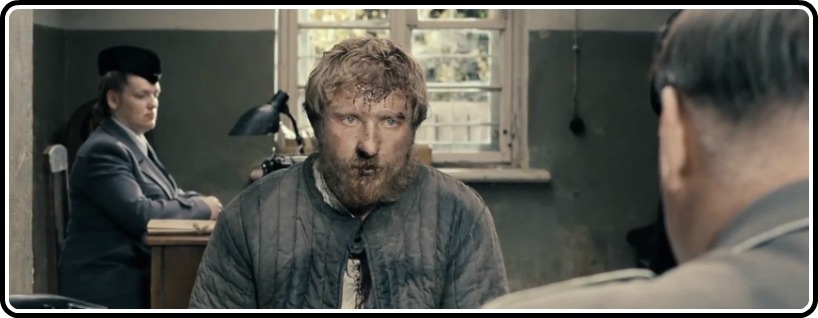
Sergei Loznitsa leapt out of his documentary roots into the realm of the narrative film (via 2010’s My Joy) with a patient fervor. That film was very much the product of a man who’d spent his cinematic career (he was a mathematician before that) observing, finding out what people tell us about their environment and what actions tell us about people. It was quietly bizarre, resembling the surreal downward spiral of a Kafka story without the more outre elements which which they’re more often associated, telling a story that lasts a few days but which feels (and I mean this in a good way) like a lifetime. With his new film, In the Fog, he abandons much of what made My Joy exceptional, opting for a moral exploration amidst a more familiar setting that is just as rigorous, but less rewarding.
Many of the details of the story are dished out through lengthy flashbacks throughout the film, but I can provide a simple enough synopsis without giving them away. In Nazi-occupied Russia, three men are hanged for partisan activities. Another man had been arrested with them, but was released, and two partisans, believing his release was arranged as a reward for his cooperation, arrive at his house one night to kill him. The circumstances of all of this are quite a bit more complex than they appear, and as every aspect of their environment bears down on the three men, the sturdy morals on which they were acting give way to a series of basic decisions that will impact the rest of their lives.
The through-line of the film is summed up in a monologue that Sushenya (Vladimir Svirskiy) gives, in which he, somewhat astonished, wonders how the reputation he’d built up his whole life could be undone so quickly by, essentially, insinuation. More broadly, it speaks to the idea of the need to create “bad guys” during a conflict as large and wide-ranging as a war, just to find some immediate sense of justice, and the weird reversals of trust that are created by these events, as it essentially means that the Russian partisans are quicker to believe what the Nazis suggest about a fellow Russian than what they could reasonably deduce to be true.
As far as that goes, the film is pretty involving, and Loznitsa’s long-take methodology lets all of these things sink in, even as he frequently moves to literalize his themes (and, by the end, the title). That it pales in comparison to My Joy is not merely a matter of stacking the director’s work alongside one another, but more broadly an issue of Eastern European cinema at the moment, which prizes long takes, stark reality, and moral arguments. While there are other films (aside from My Joy, Cristian Mungiu’s Beyond the Hills comes to mind) that work within this milieu to astounding results, films like this or Andrey Zvyagintsev’s Elena seem, in turn, somewhat tame. Perhaps it in just their increased prominence on the world’s stage, but the grind of In the Fog did not emerge especially revelatory. Its historical setting gives a distance to a moral problem the film confronts with a certain immediacy that makes for engaging drama, just not urgent drama, of which the film is in relatively little supply. It is a fine film, a good one in many ways, but unfortunately very comfortable in so many others.
For a full list of films that screened at the Portland International Film Festival, click here



![Bergman Island (The Criterion Collection) [Blu-ray]](https://criterioncast.com/wp-content/uploads/2022/11/bergman-island-the-criterion-collection-blu-ray-400x496.jpg)
![This Is Not a Burial, It’s a Resurrection (The Criterion Collection) [Blu-ray]](https://criterioncast.com/wp-content/uploads/2022/11/this-is-not-a-burial-its-a-resurrection-the-criterion-collection-blu-ray-400x496.jpg)
![Lars von Trier's Europe Trilogy (The Criterion Collection) [The Element of Crime/Epidemic/Europa] [Blu-ray]](https://criterioncast.com/wp-content/uploads/2022/11/lars-von-triers-europe-trilogy-the-criterion-collection-the-element-of-400x496.jpg)
![Imitation of Life (The Criterion Collection) [Blu-ray]](https://criterioncast.com/wp-content/uploads/2022/11/imitation-of-life-the-criterion-collection-blu-ray-400x496.jpg)
![The Adventures of Baron Munchausen (The Criterion Collection) [4K UHD]](https://criterioncast.com/wp-content/uploads/2022/11/the-adventures-of-baron-munchausen-the-criterion-collection-4k-uhd-400x496.jpg)
![Cooley High [Criterion Collection] [Blu-ray] [1975]](https://criterioncast.com/wp-content/uploads/2022/11/cooley-high-criterion-collection-blu-ray-1975-400x496.jpg)